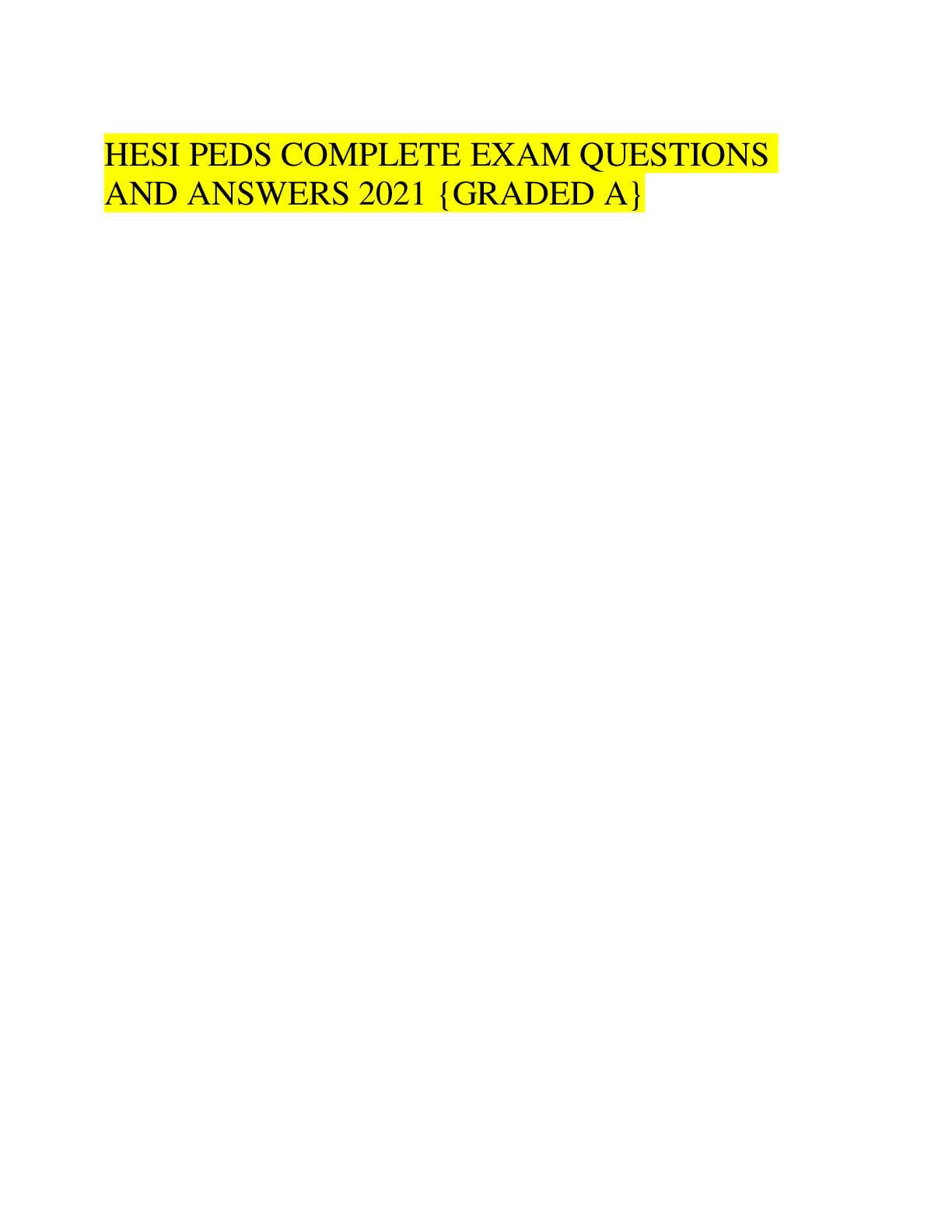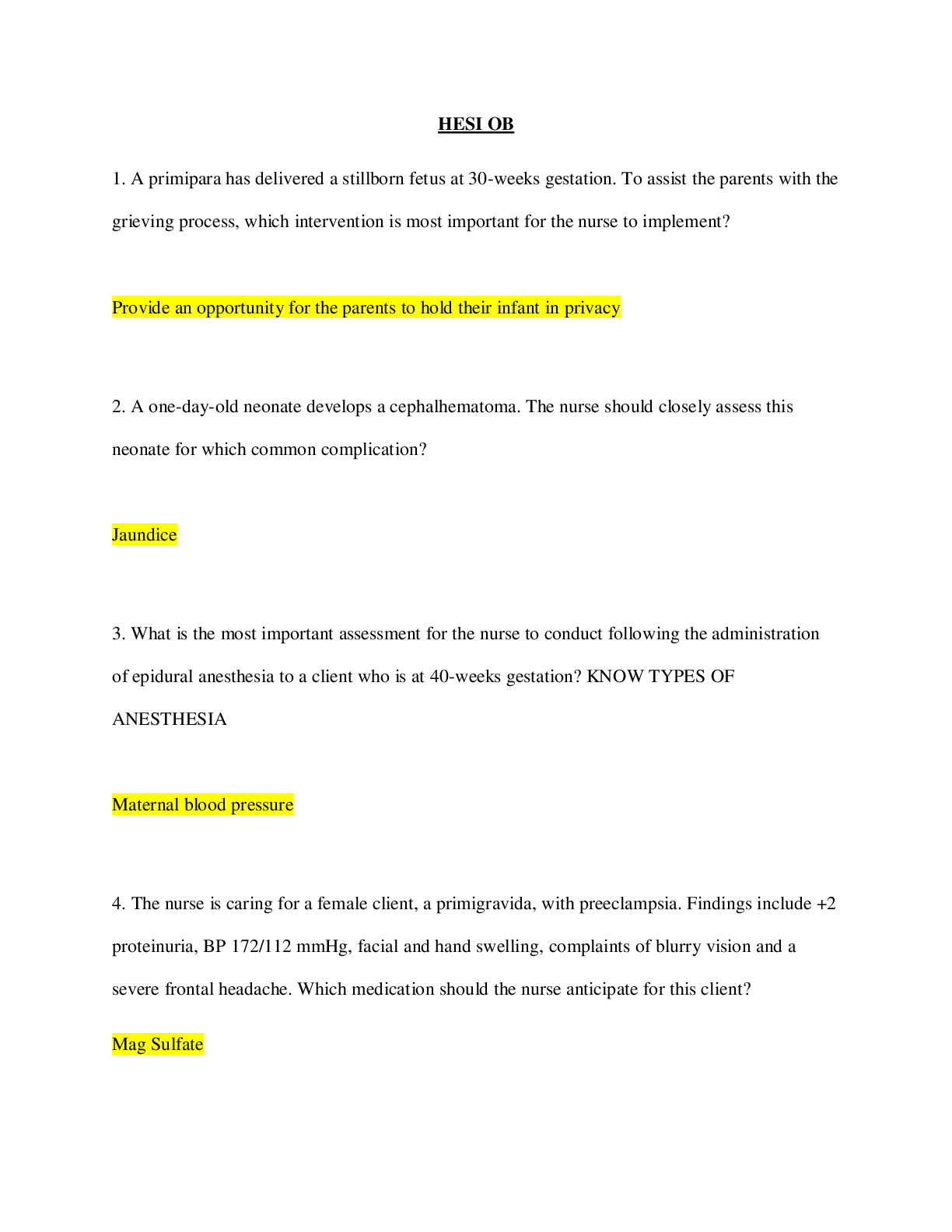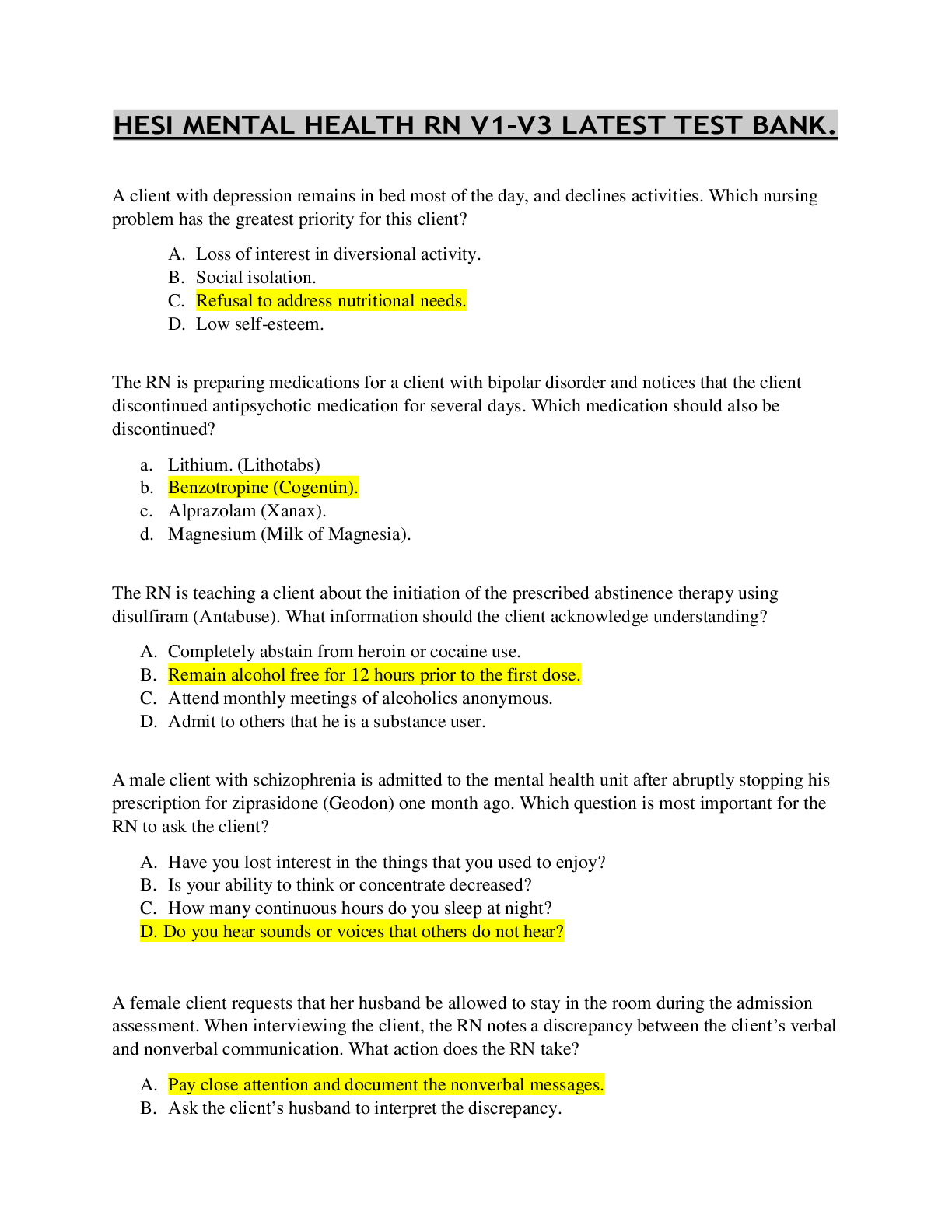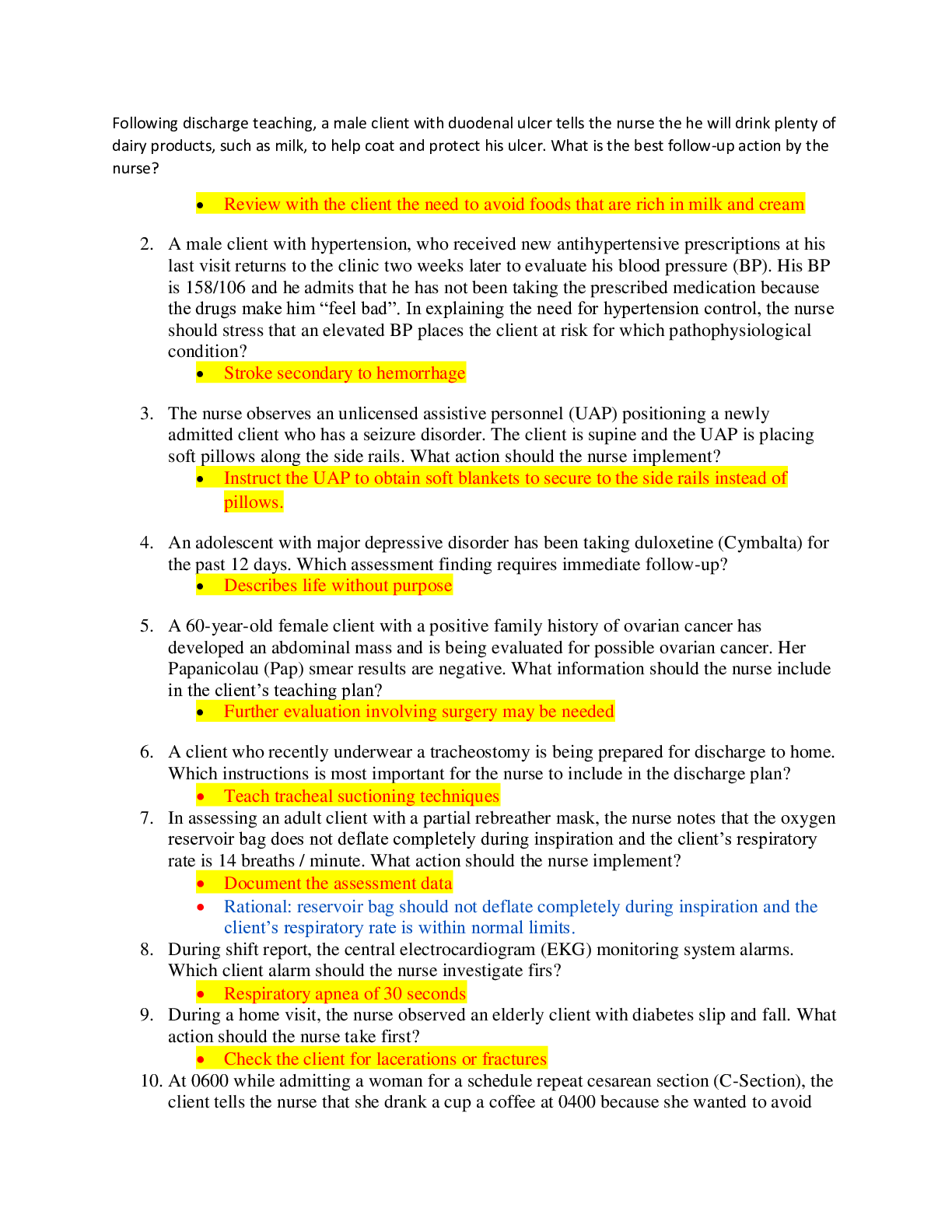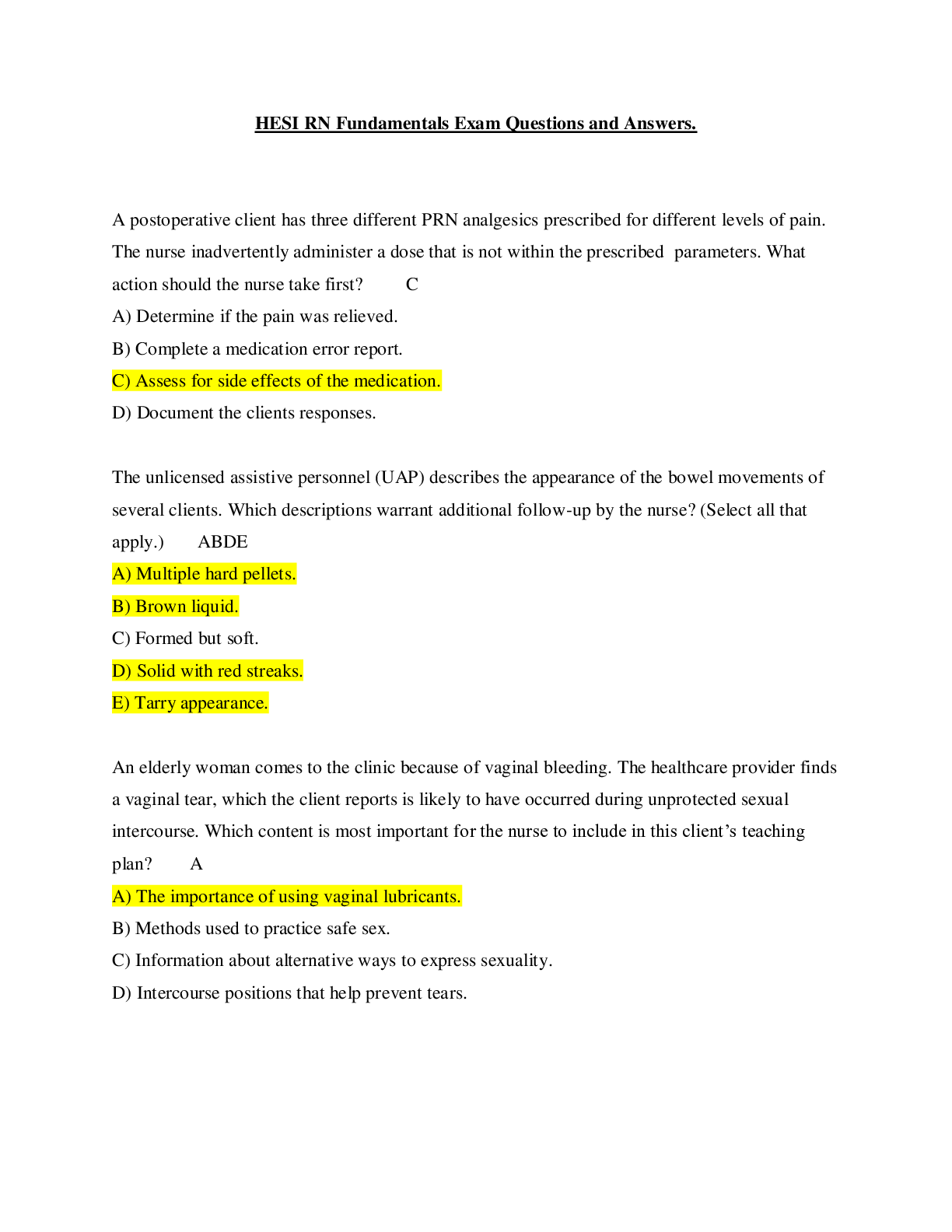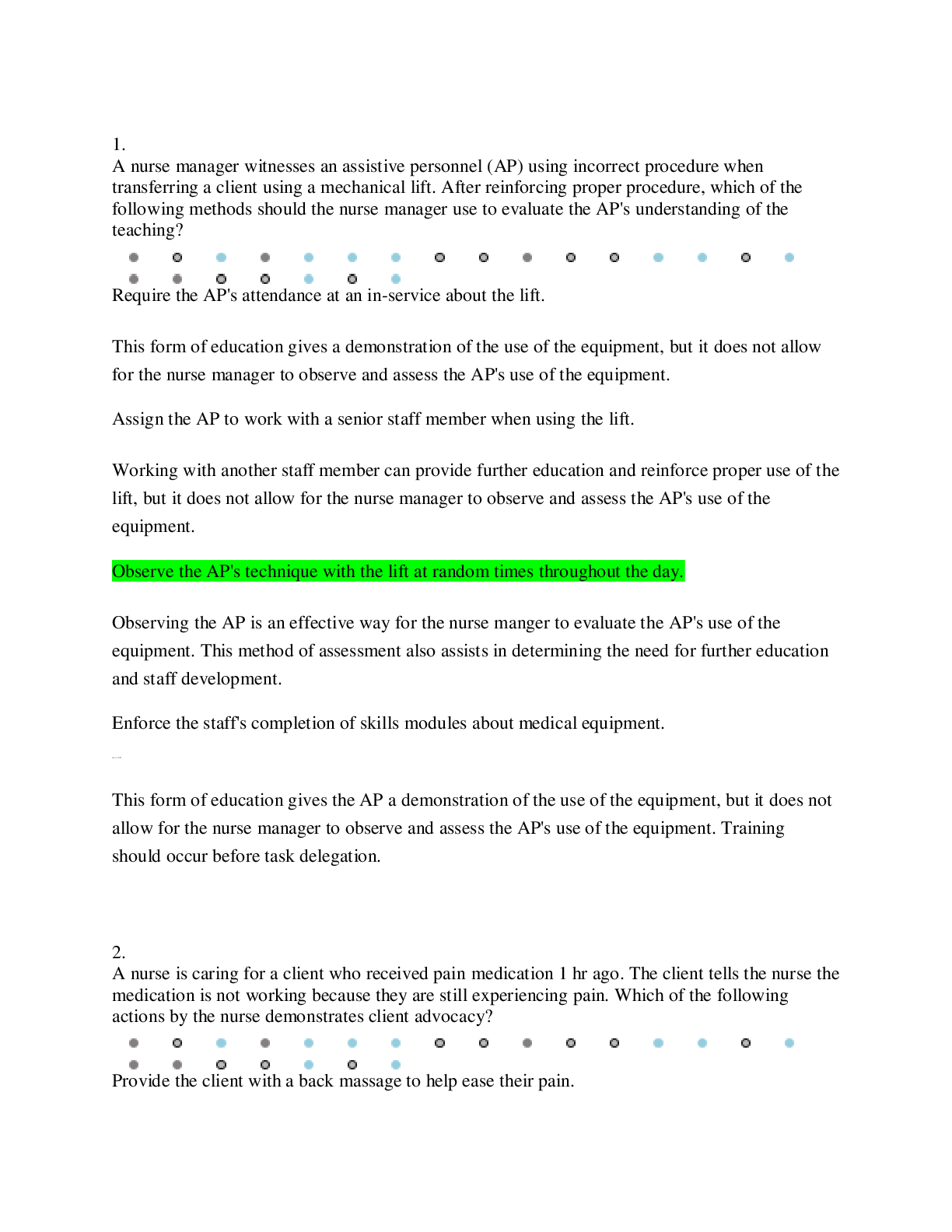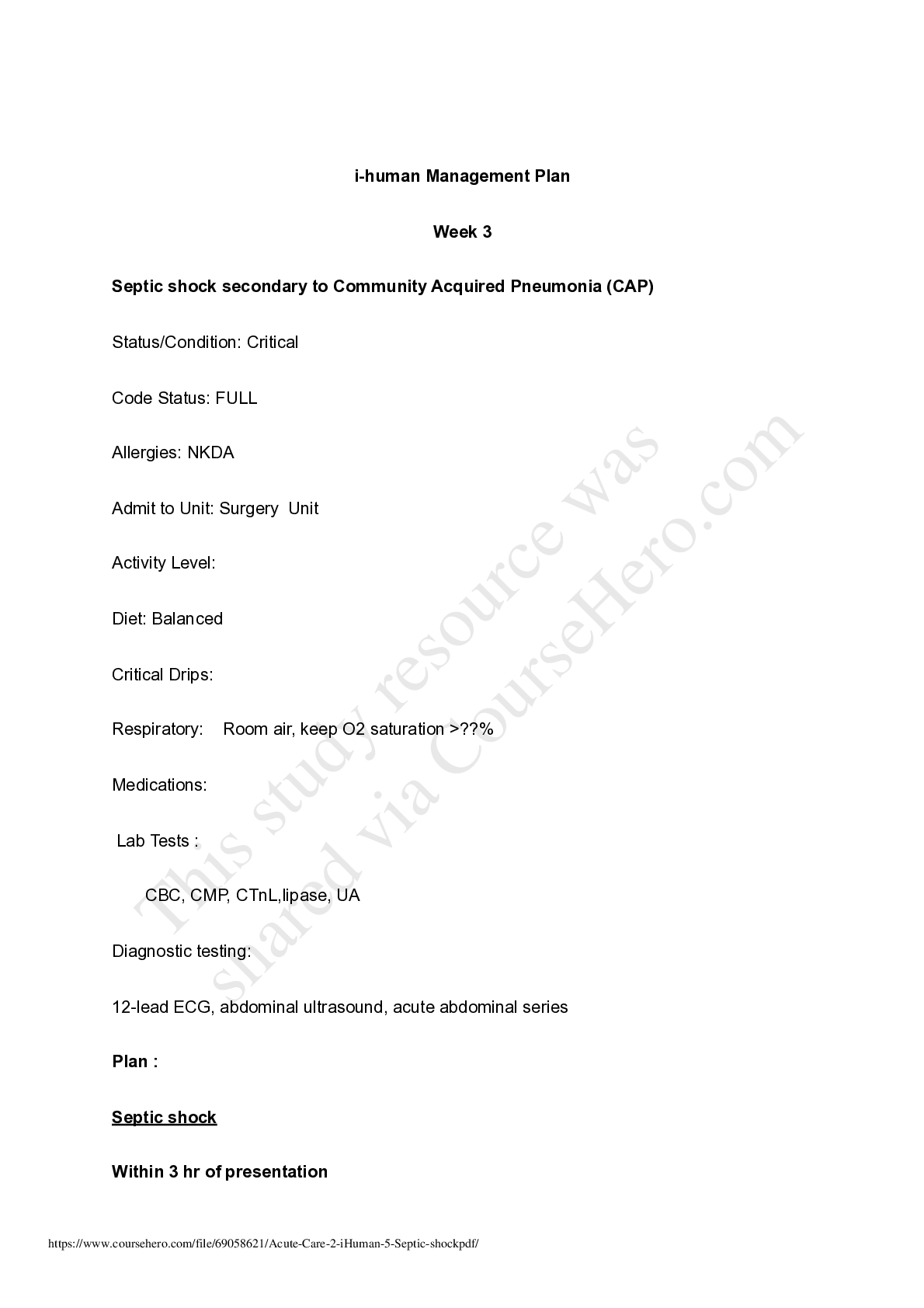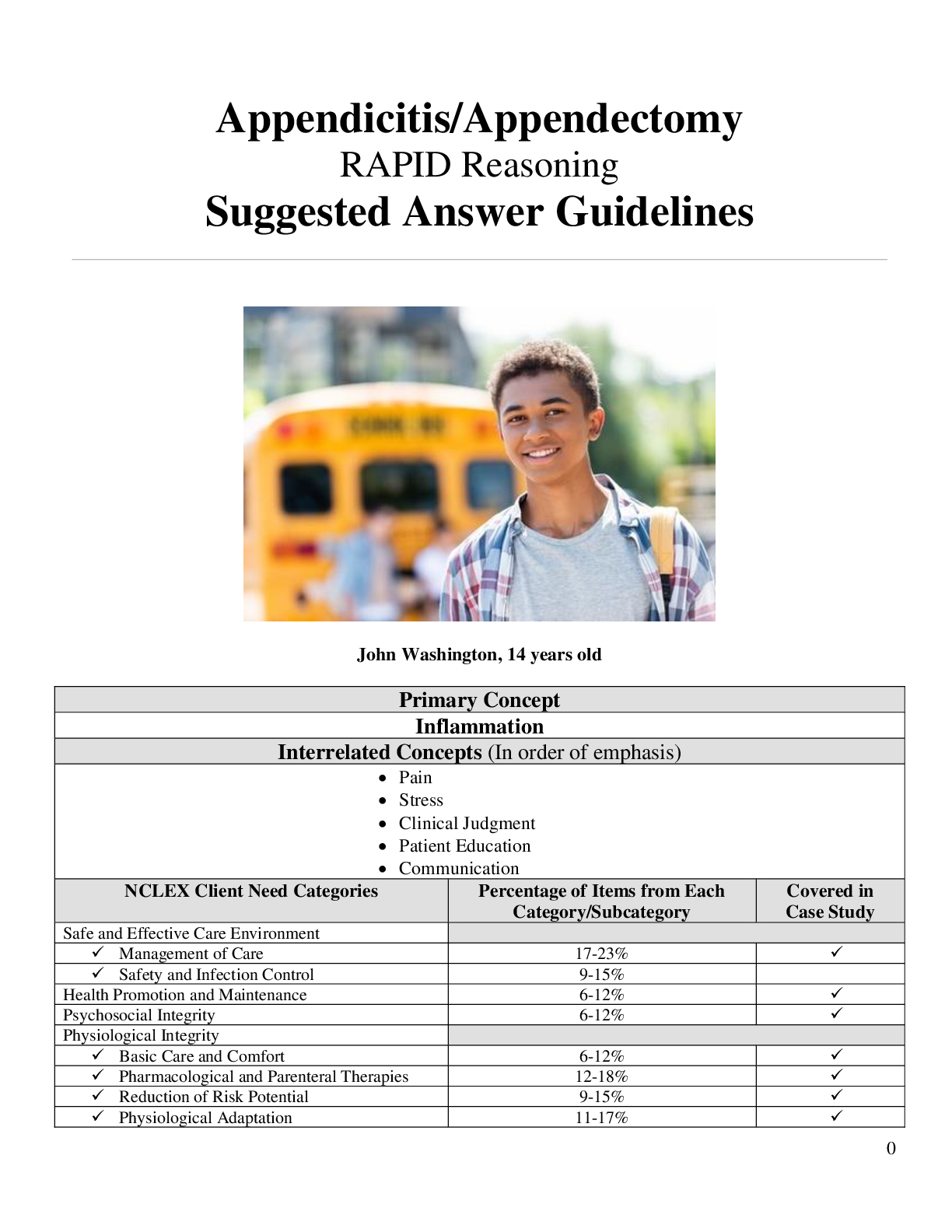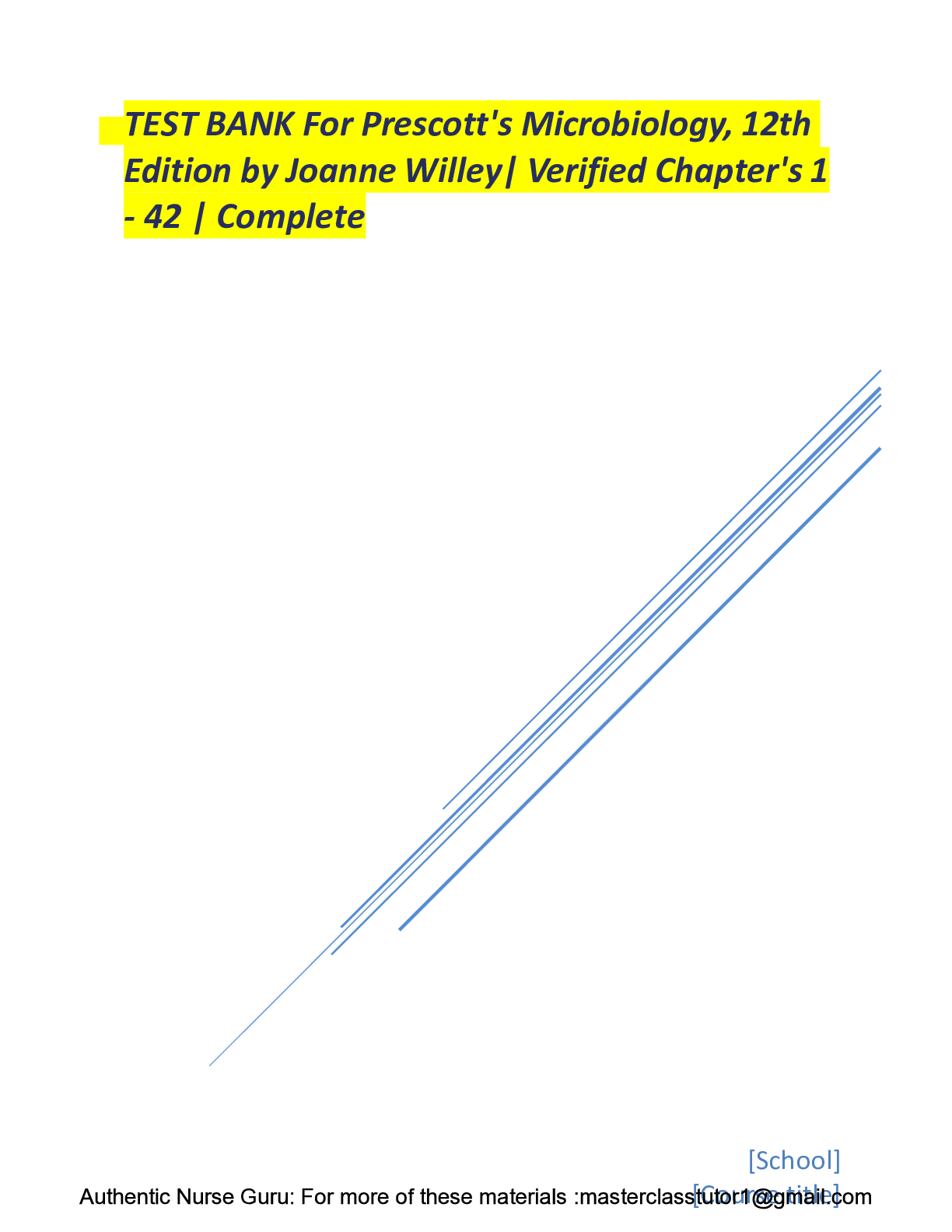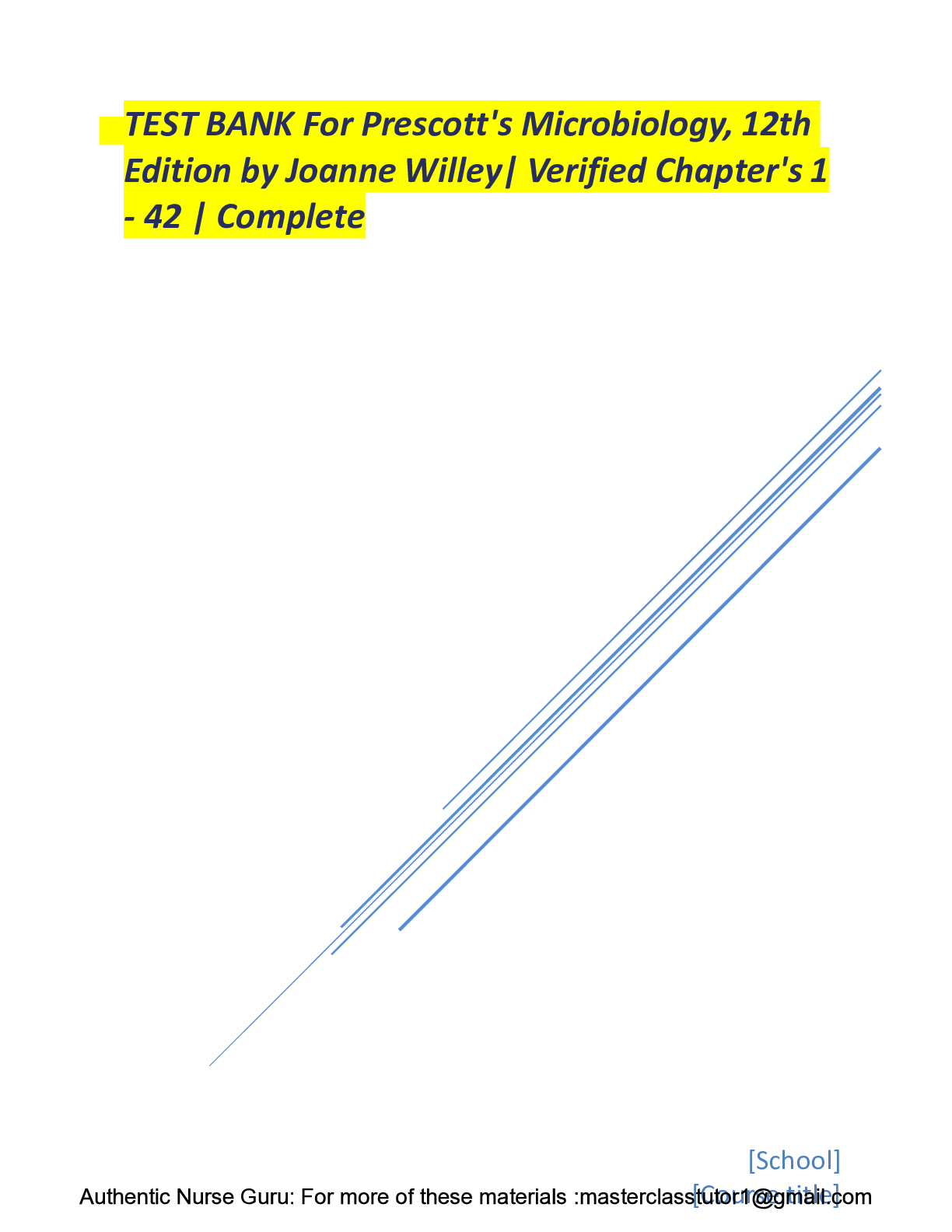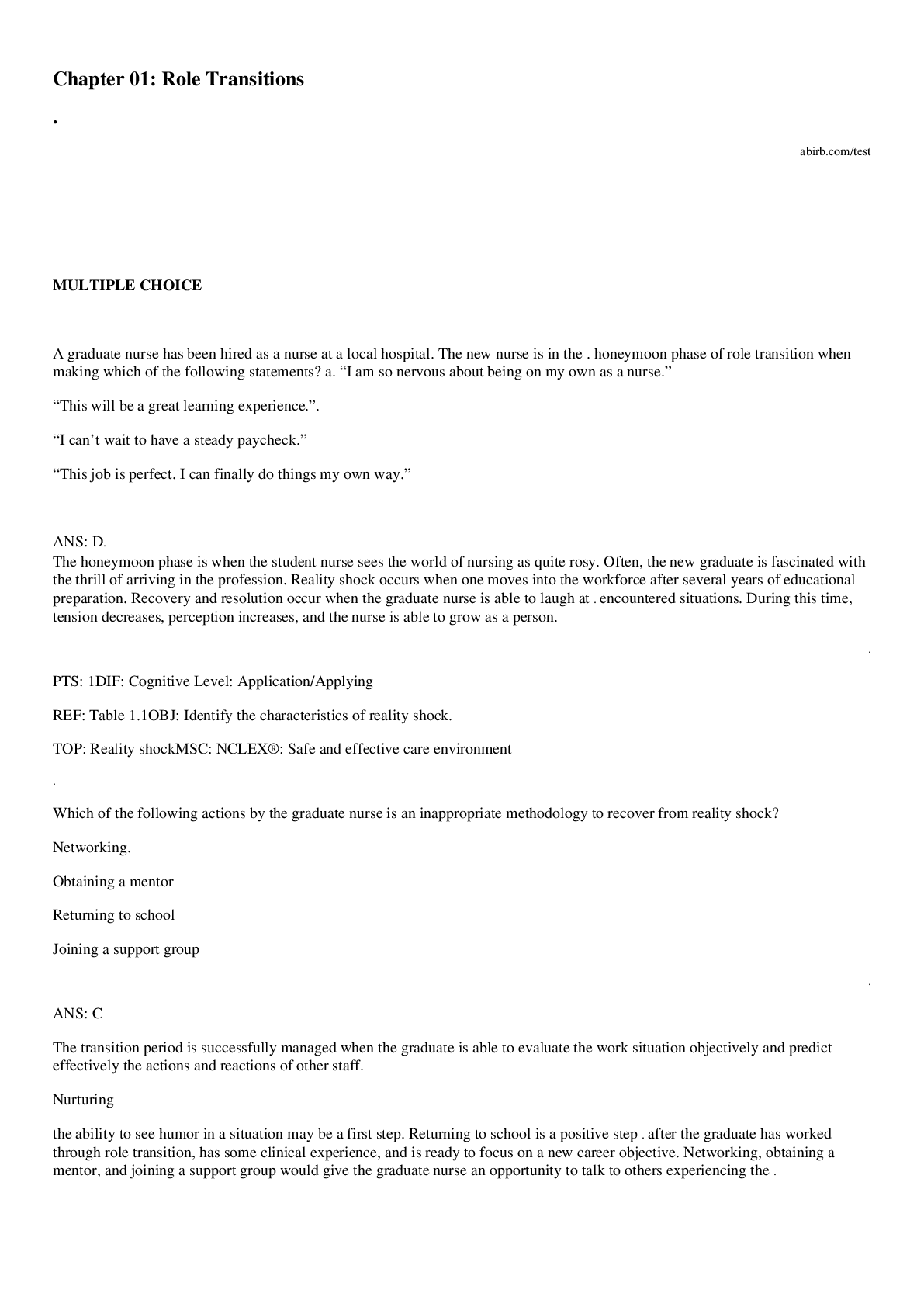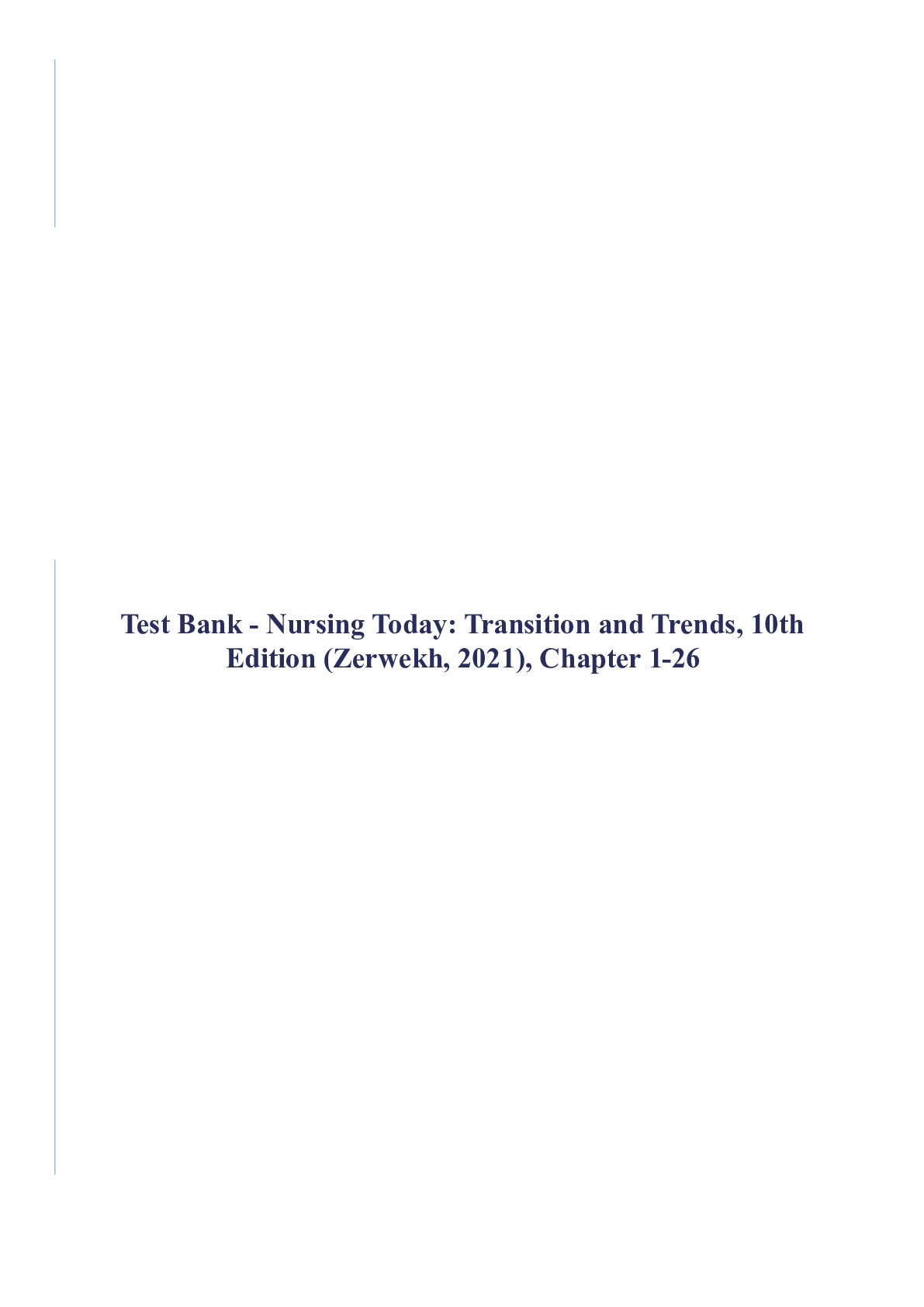*NURSING > EXAM > Test Bank For Nursing Today- Transition and Trends, 8e (Nursing Today-Transition & Trends 8th Editio (All)
Test Bank For Nursing Today- Transition and Trends, 8e (Nursing Today-Transition & Trends 8th Edition by JoAnn Zerwekh, Ashley Zerwekh Garneau Test Bank
Document Content and Description Below
Test Bank For Nursing Today- Transition and Trends, 8e (Nursing Today-Transition & Trends 8th Edition by JoAnn Zerwekh, Ashley Zerwekh Garneau Test Bank Current Stock: Description Descrip... tion Nursing Today- Transition and Trends, 8e (Nursing Today-Transition & Trends 8th Edition by JoAnn Zerwekh, Ashley Zerwekh Garneau Test Bank Chapter 03: Mentorship, Preceptorship, and Nurse Residency Programs MULTIPLE CHOICE The nurse manager is presenting at a conference and shows an adequate understanding of a mentoring relationship when giving the following as an example: a. A coach and a player c. An intern and a resident b. A teacher and a learner d. An advisor and a partner ANS: D In nursing, mentor is synonymous with trusted advisor, and mentoring is a partnership between two people. Coaches help individuals find new ways to solve problems, reach goals, and design plans of action to motivate people to perform at the “top of their game.” The teacher and learner relationship involves an evaluation component (receiving a grade in a course). The intern reports to the resident, so there is more of a precepting relationship because the resident is the clinical expert, and there may also be an evaluation component in this relationship. PTS: 1 DIF: Cognitive Level: Application REF: pp. 50-51 OBJ: Describe the difference between mentoring, coaching, and precepting. TOP: Mentoring relationship MSC: NCLEX®: Not applicable The nurse professor is lecturing to students in their final semester of nursing school. Which statement by the nurse professor about mentoring is accurate? a. “Mentoring involves solving an individual’s problems.” b. “Mentoring focuses on the needs of someone else.” c. “Mentoring means helping someone reach his or her long-term goals.” d. “Mentoring requires pairing an experienced person with a novice.” ANS: B Mentoring requires a primary focus on the needs of the mentee and an effort to fulfill the most critical of these needs. Meeting these needs first makes achievement of goals more realistic. Mentoring does not involve solving an individual’s problems, helping someone reach long-term goals, or pairing an experienced person with a novice. PTS: 1 DIF: Cognitive Level: Application REF: p. 51 OBJ: Identify characteristics of effective mentors, mentees, and preceptors. TOP: Description of mentoring MSC: NCLEX®: Not applicable While discussing a mentoring program with the nursing director, the nurse manager correctly states that mentoring is a a. partnership. c. static relationship. b. one-way street. d. method of gaining more experience. ANS: A Mentoring is a partnership and a two-way street with both parties freely contributing to the relationship as equals working together, based on mutual respect. Mentoring is not used as a method to gain more experience. Mentoring is a dynamic, not a static, relationship. Gaining experience is often associated with precepting. PTS: 1 DIF: Cognitive Level: Application REF: p. 51 OBJ: Identify characteristics of effective mentors, mentees, and preceptors. TOP: Description of mentoring MSC: NCLEX®: Not applicable You are a graduate nurse in search of a mentor. To find a good “match,” what should you look for? a. Choose an experienced nurse who is successful. b. Look for things you and the potential mentor have in common. c. Be very specific with the questions you ask of the possible mentor. d. Be careful not to disclose too much personal information. ANS: B When considering establishing a mentoring relationship, look for commonalities in nursing education, areas of expertise or practice, or interests. Feeling comfortable and building trust are crucial for a successful mentoring relationship. Broad, open-ended questions stimulate discussion and offer an opportunity to assess and establish the mentor relationship. It is important to discuss yourself and be open in a light and friendly manner when talking with a potential mentor. Being an experienced nurse would be an important criterion for a preceptor. PTS: 1 DIF: Cognitive Level: Application REF: pp. 57-58 OBJ: Identify characteristics of effective mentors, mentees, and preceptors. TOP: Effective mentoring relationship MSC: NCLEX®: Not applicable A group of nursing students is discussing mentors. One of the students correctly states a characteristic of a successful mentor when stating: a. “They ensure that their mentees do not fail.” b. “They push the mentees to a higher level.” c. “They always ask a lot of questions of their mentees.” d. “They encourage mentees to question their skills so they can improve.” ANS: B Mentors need to communicate high expectations to mentees and push them to meet or exceed these expectations. Mentors should not ensure that mentees do no fail because this is often a great learning experience for mentees. Frequently questioning mentees or encouraging mentees to question their skills is not indicative of a successful mentor. Mentors are good listeners, offer empathy and encouragement, and are generous with their time and knowledge. PTS: 1 DIF: Cognitive Level: Application REF: pp. 57-58 OBJ: Identify characteristics of effective mentors, mentees, and preceptors. TOP: Successful mentorship MSC: NCLEX®: Not applicable The role of the mentee needs to be understood early in the mentoring relationship. What is a characteristic or example of the mentee’s role? a. Not interrupting the mentor b. Absorbing what the mentor explains in detail c. Establishing personal short- and long-term goals d. Finding out what the mentor has to offer in terms of experience ANS: C Establishing your goals early will help you get exactly what you need from the mentoring relationship. The mentee should ask questions when clarification is needed because communication is very important. The mentor’s nursing experience is not considered part of the mentee’s role. Absorbing information may relate more to a preceptor providing information on content or skills. Finding out the experience is probably more applicable to the preceptor relationship. PTS: 1 DIF: Cognitive Level: Application REF: p. 56 OBJ: Identify characteristics of effective mentors, mentees, and preceptors. TOP: Role of mentee MSC: NCLEX®: Safe and effective care environment—management of care Which statement indicates the student nurse’s understanding of a situational relationship? a. “A situational relationship occurs only one time.” b. “A situation relationship is established by the organization.” c. “In a situational relationship, both mentee and mentor mutually accept it.” d. “A situational relationship is structured to ensure situational success.” ANS: A Characteristically, a situational mentoring relationship is a one-time event. Organizations usually establish formal relationships. Acceptance by the mentee and mentor is characteristic of an informal relationship. A structured relationship is formal. PTS: 1 DIF: Cognitive Level: Application REF: p. 60 OBJ: Discuss the types of mentoring relationships. TOP: Situational mentoring relationship MSC: NCLEX®: Not applicable The “honeymoon” is a specific phase of reality shock. What should the mentor do during this phase? a. Share personal transition experiences with the mentee. b. Reinforce the need for the mentee to problem solve. c. Encourage the mentee to try new things. d. Act as the intermediary for the mentee with all staff members. ANS: D During the “honeymoon” phase, the mentor should be supportive (by listening and understanding), act as an intermediary with other staff members, and be a role model. Sharing feelings and experiences and the mentor’s own transition experience are appropriate in the shock and rejection phase. Trying new things and stepping outside the mentee’s comfort zone would be appropriate for the mentor to encourage during the recovery phase of reality shock. PTS: 1 DIF: Cognitive Level: Application REF: p. 61 OBJ: Discuss the types of mentoring relationships. TOP: Mentoring during reality shock phase MSC: NCLEX®: Safe and effective care environment—management of care A new graduate is looking for a mentor. Which staff nurse would be the best choice? a. Louise, a skilled clinician who appears hurried, curt, and occasionally sarcastic b. Jill, a new graduate who worked 2 years as an LPN and seems confident c. Juan, who has 3 years of experience, good skills, and a sense of humor d. Kim, who has 6 years of experience and is highly intellectual but is aloof and self-centered ANS: C The mentor not only serves as a role model or counselor for the new graduate but also actively advises, guides, and promotes the graduate’s career. It is important to select someone who will work with you and has nursing experience as a nurse. Frequently, nurses with 3 to 5 years of experience remember their own role transition and can relate to what the new graduate is experiencing. Louise is curt and sarcastic, which would not be supportive behavior of a mentor. Jill is too recent a graduate. Kim is aloof and self-centered and would not be a good candidate for a mentor because mentors willingly are personally invested in their mentee. PTS: 1 DIF: Cognitive Level: Evaluation REF: pp. 57-58 OBJ: Describe four possible resolutions for reality shock. TOP: Selecting a mentor MSC: NCLEX®: Not applicable Which of the following statements by the nurse indicates an understanding of mentors? a. “Mentors focus on fostering the mentee’s individual growth and development over an extended period of time.” b. “Mentors develop nurturing relationships during work time.” c. “Mentoring is the approach of assisting an individual’s growth through partnership.” d. “The strength of mentoring lies in the facilitation and development of personal qualities.” ANS: A Mentoring involves focus on fostering the mentee’s individual growth and development over an extended period of time. Mentors develop nurturing relationships during personal time. Coaching is the approach of assisting an individual’s growth through partnership. The strength of mentoring lies in the mentor’s specific knowledge and wisdom. [Show More]
Last updated: 1 year ago
Preview 1 out of 20 pages
Instant download
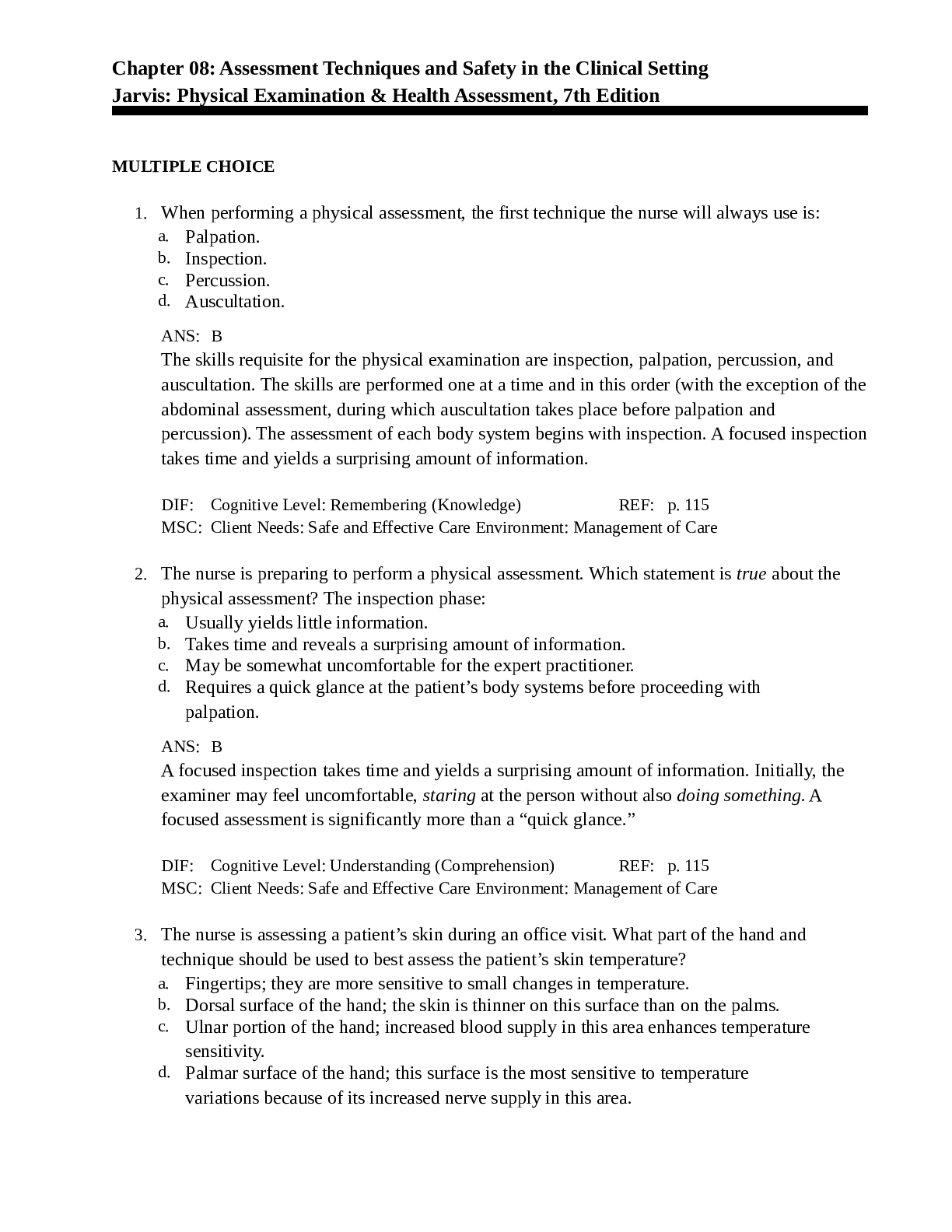
Buy this document to get the full access instantly
Instant Download Access after purchase
Add to cartInstant download
Reviews( 0 )
Document information
Connected school, study & course
About the document
Uploaded On
Jan 21, 2021
Number of pages
20
Written in
Additional information
This document has been written for:
Uploaded
Jan 21, 2021
Downloads
0
Views
42


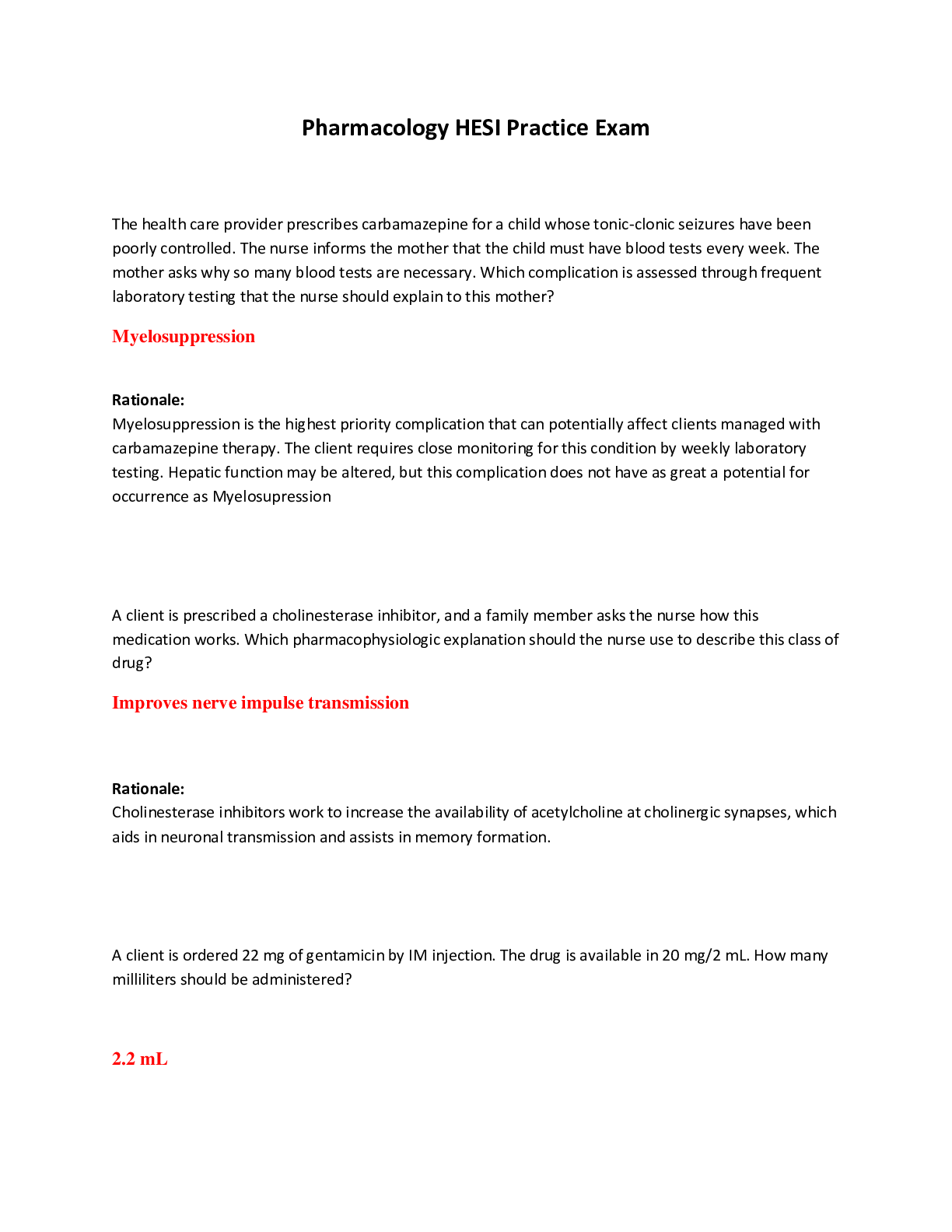
.png)
